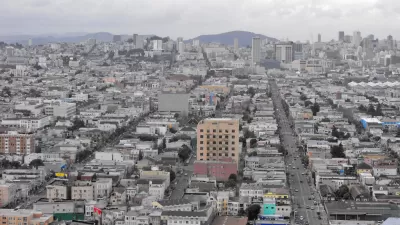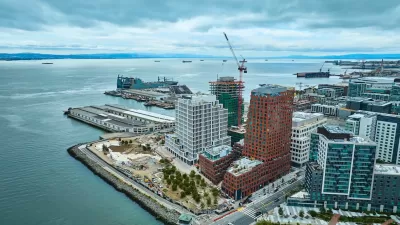In terms of land area, San Francisco’s a small city. Yet if current policies persist, the city will build 92,000 parking spots for residents by 2040, on just 49 square miles of land.

That’s led some observers to suggest that now is the time to get real about changing San Francisco’s transportation habits. It’s not just a question of ideology, as Aaron Bialick points out. Beyond environmental concerns is a simple question of space: how many more cars can the city realistically hold?
Even the the Market-Octavia Plan, which has a strict maximum parking ratio, fails to set an upward limit on parking expansion. “Unless plans and the priorities of our leaders change . . . , San Francisco is destined to have worse congestion, less effective transit, and unlivable streets,” writes Bialick.
FULL STORY: The More Space SF Uses to Store Cars, the Less We'll Have to House People

Planetizen Federal Action Tracker
A weekly monitor of how Trump’s orders and actions are impacting planners and planning in America.

Map: Where Senate Republicans Want to Sell Your Public Lands
For public land advocates, the Senate Republicans’ proposal to sell millions of acres of public land in the West is “the biggest fight of their careers.”

Restaurant Patios Were a Pandemic Win — Why Were They so Hard to Keep?
Social distancing requirements and changes in travel patterns prompted cities to pilot new uses for street and sidewalk space. Then it got complicated.

Platform Pilsner: Vancouver Transit Agency Releases... a Beer?
TransLink will receive a portion of every sale of the four-pack.

Toronto Weighs Cheaper Transit, Parking Hikes for Major Events
Special event rates would take effect during large festivals, sports games and concerts to ‘discourage driving, manage congestion and free up space for transit.”

Berlin to Consider Car-Free Zone Larger Than Manhattan
The area bound by the 22-mile Ringbahn would still allow 12 uses of a private automobile per year per person, and several other exemptions.
Urban Design for Planners 1: Software Tools
This six-course series explores essential urban design concepts using open source software and equips planners with the tools they need to participate fully in the urban design process.
Planning for Universal Design
Learn the tools for implementing Universal Design in planning regulations.
Heyer Gruel & Associates PA
JM Goldson LLC
Custer County Colorado
City of Camden Redevelopment Agency
City of Astoria
Transportation Research & Education Center (TREC) at Portland State University
Camden Redevelopment Agency
City of Claremont
Municipality of Princeton (NJ)



























